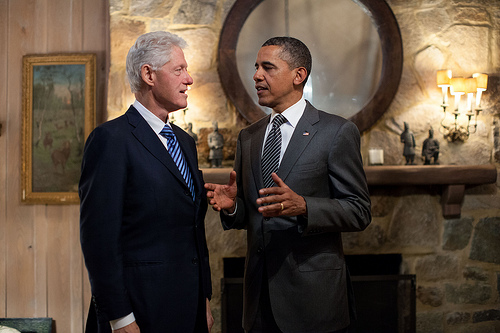
Republican members of Congress spent much of the beginning of 1993 warning that raising taxes on the rich would destroy the economy.
“It will kill jobs, kill businesses, and yes, kill even the higher tax revenues that these suicidal tax increasers hope to gain,” Rep. Christopher Cox said.
And cut to the best job growth of the century — over 22 million jobs — and the first budget surplus in generations.
Of course, the nineties were an anomaly, with the end of the Cold War and the government’s decades-long investment in the internet suddenly paying off exponential returns. You can’t expect those kinds of returns again.
Cut to 2013, when President Obama’s re-election allowed most of the Bush tax breaks to expire with Republicans making similar warnings.
The result? Well, it wasn’t the best job creation of the century – yet. The 2,331,000 jobs created in 2013 was shy of 2005’s 2,506,000, which was fueled by the tens of billions of dollars the Bush Administrations flushed into defense and Homeland Security. I’d argue that 2013’s job growth could have beaten 2005 if not for Congress allowing a payroll tax to expire as the sequester went into effect. And don’t forget the how the GOP shut down the government for no discernible purpose.
In 2014, taxes again went up on those in the top percentiles to fund the Affordable Care Act. And with that money we were able to help 10 million Americans gain health insurance.
The result? According to the Labor Department, 2014 has already surpassed 2005 as the best year of job growth this century with 2,650,000 jobs projected to have been created through November.
Democratic policies that ask the rich to invest in our economy is the only way we ever created middle class jobs and it pays off for the rich.
“The U.S. economy not only grows faster, according to real GDP and other measures, during Democratic versus Republican presidencies, it also produces more jobs, lowers the unemployment rate, generates higher corporate profits and investment, and turns in higher stock market returns,” Princeton University professors Mark W. Watson and Alan Blinder have found. “Indeed, it outperforms under almost all standard macroeconomic metrics.”
And since Reaganomics radically reshaped our economy to reward investment over work, you could argue it benefits the rich too much.
“It used to be that when the U.S. economy grew, workers up and down the economic ladder saw their incomes increase, too,” The Washington Post‘s Jim Tankersley writes in his epic six-part series “Why America’s middle class is lost”. “But over the past 25 years, the economy has grown 83 percent, after adjusting for inflation — and the typical family’s income hasn’t budged. In that time, corporate profits doubled as a share of the economy. Workers today produce nearly twice as many goods and services per hour on the job as they did in 1989, but as a group, they get less of the nation’s economic pie. In 81 percent of America’s counties, the median income is lower today than it was 15 years ago.”
We’re hearing lots of cries about tax reform, which for some like Paul Ryan would still include tax cuts for the richest, even though evidence suggests that such cuts are fueling inequality. Other reform plans will end the tax breaks on investment income in exchange for lowering the number of tax brackets.
Warren Buffet pointed out that we are “coddling” the super rich, who often pay lower tax rates than the merely rich.
“According to new research by Emmanuel Saez of the University of California at Berkeley and Gabriel Zucman of the London School of Economics, the richest one-hundredth of one percent of Americans now hold over 11 percent of the nation’s total wealth,” former Secretary of Labor Robert Reich points out. “That’s a higher share than the top .01 percent held in 1929, before the Great Crash.”
The richest of the richest have more money than they can spend in a lifetime and more than millions of American families combined. It’s insanity that any discussion of tax reform doesn’t include a higher bracket asking them to invest a bit more in our economy.
And it’s the kind of insanity we’ve gotten used to because of the disproportionate influence the richest have on our political system — even though asking the super rich to pay more is good for everyone, including the super rich.
You can argue that the average American family pays an “inequality tax” of about 15 percent as a result of the conservative policies that weakened labor’s bargaining position and flooded productivity gains to the top.
We have to do numerous things to rebuild our economy and restore the power of labor but first we must kill the myth that coddling the rich is good for the economy. They can afford to pay more and they should.



